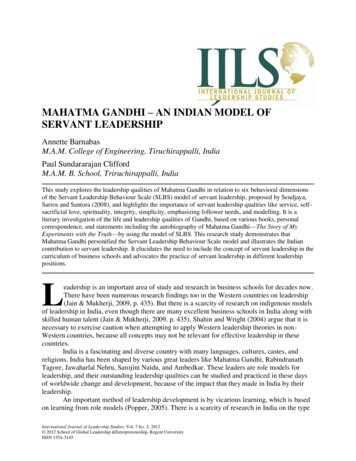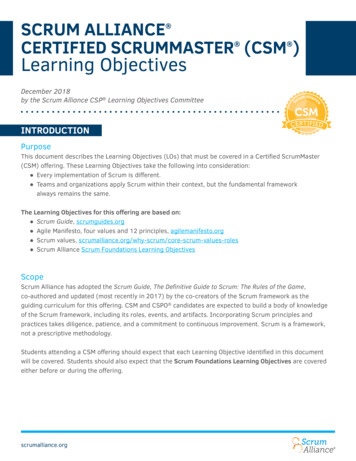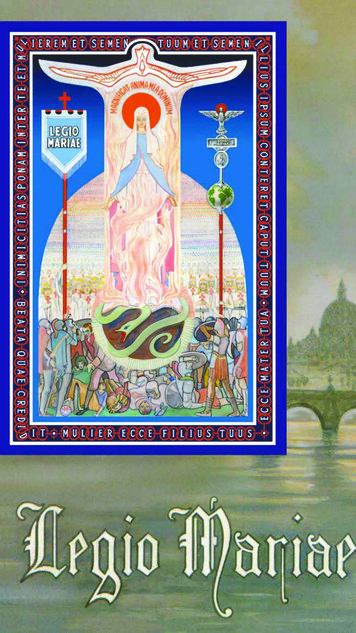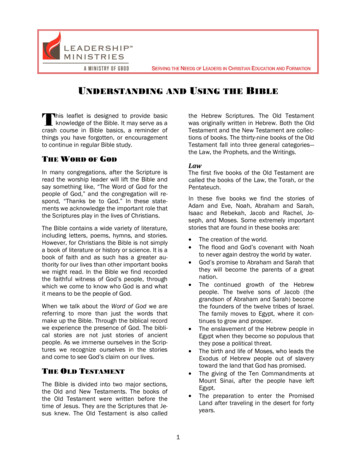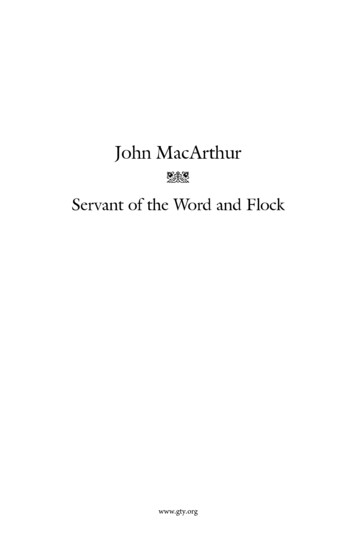
Transcription
John MacArthurnmServant of the Word and Flockwww.gty.org
iiJohn MacArthur: Servant of the Word and FlockOther biographies by the author:The Forgotten SpurgeonThe Life of Arthur W. PinkD. Martyn Lloyd-Jones: The First Forty YearsD. Martyn Lloyd-Jones: The Fight of Faith(The Two-Volume Authorized Biography)Jonathan Edwards: A New BiographyThe Life of John MurrayWesley and Men Who Followedwww.gty.org
iiiJohn MacArthurServant of the Word and FlocknmIain H. MurrayTHE BANNER OFiii TRUTH TRUSTwww.gty.org
the banner of truth t r u s t3 Murrayfield Road, Edinburgh EH12 6EL, UKP.O. Box 621, Carlisle, PA 17013, USAnm Iain H. Murray 2011First Published 2011Reprinted 2011ISBN: 978 1 84871 112 9Typeset in 11/16 pt Galliard BT atThe Banner of Truth Trust, EdinburghPrinted in the USA byVersa Press, Inc.,East Peoria, ILwww.gty.org
ToThe Elders, Staff, and Members ofGrace Community Churchwith thankfulness for the grace given to themto serve Christians across the world. www.gty.org
viJohn MacArthur: Servant of the Word and Flockwww.gty.org
viiContentsIllustrationsixForewordxiIntroduction: What Is an Evangelical Leader?11. Youth in California52. The Bible Takes First Place173. The Early Ministry at Grace Community Church314. Threatening Reversals435. Scripture and Preaching576. The Rediscovery of Old Truth697. The 1980s798. Across the Pacific939. Controversy11110. Patricia MacArthur12911. A Correction and an Example from Russia14312. Grace to You15513. A Basket of Letters173viiwww.gty.org
viii John MacArthur: Servant of the Word and Flock14. Objections and Questions18315. The Changing Scene in the United States19716. A Visit to Grace Community Church21317. The Man229Index241www.gty.org
IllustrationsixIllustrationsEndpapers, Front: The Master’s College, 21726 PlaceritaCanyon Road, Santa Clarita, CA 91321, by courtesy ofLukas VanDykeRear: A Sunday service at Grace Community ChurchFrontispiece: John and Patricia MacArthur, New Zealand,19881. Jack and Irene MacArthur, 1950s72. Football, John playing for Los Angeles Pacific College against California State University in Long Beach,California, Fall 19623. John marrying Patricia Sue Smith, August 1963134. John with John Perkins, 1967255. Father and son, mid 1960s306. Map of Sun Valley Freeways417. Family portrait92218. Patricia MacArthur1289. A Shepherds’ Seminar in Russia154Colour insert between pp. 154 & 15510. John enjoying the Pacific11. The first Church (1956)ixwww.gty.org
John MacArthur: Servant of the Word and Flock12. Ground-breaking of Grace to You13. The new Grace to You building14. Students of the Master’s College15. John greeting student of Master’s Seminary16. Grace Community Church Campus Map17. Architect’s drawing of Church Campus18. Volunteer helpers at Grace to You19. Don Green, Phil Johnson, and Mike Taylor20. Four generations of MacArthurs21. Almost the whole family, 200922. Dr MacArthur in the pulpit at Grace23. Patricia with John24. ‘Life’s Most Important Question’25. Aerial photo of Grace Community Church Campus22326. John MacArthur228www.gty.org227
xiForewordFriendship with John MacArthur over the last dozenyears has been one of the happiest surprises of my life.Surprise because we live on opposite sides of the world, andbecause, coming from somewhat different evangelical traditions, we might not seem to be natural fellow-labourers. It wasshared convictions on great truths that brought us together,as they are bringing others committed to Scripture togetheracross the world.Writing a biography of Dr MacArthur never occurred to meuntil an event in 2009. Prior to that date the elders of his churchasked me to preach on the fortieth anniversary of his ministryat Grace Community Church at Sun Valley, Los Angeles, whichwas being marked on Sunday, February 1, 2009. I sensed thatsome comment by me on the ministry we were commemorating would be appropriate, but how to address that subject wasnot at first clear to me. Believing as we do that the pulpit onthe Lord’s Day is for preaching His Word, that possibility wasexcluded. I therefore settled for writing a biographical sketchas a short tribute.Unknown to me, Phil Johnson and Mike Taylor (editorsworking for Grace to You and members of Grace CommunityChurch) had a volume in preparation to mark the anniversary,xiwww.gty.org
xiiJohn MacArthur: Servant of the Word and FlockTruth Endures: Landmark Sermons by John MacArthur. This bookwas at the printers when my sketch arrived towards the end of2008. Johnson and Taylor wrote, ‘It came unexpectedly aftercorrected proofs had already been sent to the printer.’ They‘stopped the presses’ and included my sixty pages of ‘biographical sketch’. While I appreciated this kindness and honour, I wasconscious that I had left too much unsaid, and that led to thebook now in the reader’s hands. It includes most of that originalpiece with a good deal more. My hope is to pass on to othersthe encouragement that I have found myself in the record ofJohn MacArthur’s life and ministry.This is still little more than a ‘sketch’: a full portrait must awaita later date and come from another hand. It is not the time fora full biography while a person’s life is still in progress. John’sambition is to minister the Word of God to the end of his life;in his phrase, ‘to die with his boots on’. His father was sparedto serve until he passed ninety years of age; whether our friendlives to that age or not, he believes it is a duty to keep ‘growing’as long as life lasts: ‘People sometimes point out to me that whatI’ve said on one tape doesn’t agree with what I said on a latertape. My response to them is that I am growing. I did not knoweverything then, and I do not know everything now.’ So, as hesaid on another occasion, ‘You’ll never be able to evaluate theministry of John MacArthur until all the evidence is in.’While I have not written these pages in conjunction withJohn, the aid of a number of people in his congregation hasbeen indispensable. Especial thanks are due to Rick Holland,Phil Johnson, and Don Green. Mr Johnson’s knowledge ofunpublished source material is unique; I could not have written without it, and it is my hope that he will himself one daywww.gty.org
Forewordxiiiwrite on the ministry in which he has so largely shared. Staffmembers, Pat Rotisky and Catherine Curry, have been a greathelp to me, and numbers of others at Grace Community Churchhave encouraged us in various ways. The days which my wifeand I have spent at the church, and at Grace to You, will everbe treasured memories. In a congregation where the blessing ofGod is known there will ever be affection between the people,and others find a ready welcome. So it has been for us at SunValley.I am indebted to John MacArthur for the liberty to quotehim as extensively as I do; and to Mrs Patricia MacArthur forher valued measure of input and for allowing the use of family photographs. Banner staff have given their customary bestsupport in the production of this title, and my friends, Ian S.Barter and John R. de Witt, gave helpful comment on my draft.Jean, as ever, has kept everything running happily in our home,while I only looked after the computer.Iain H. MurrayEdinburgh,August 2010www.gty.org
IntroductionWhat Is an Evangelical Leader?Prized by John MacArthur is an old edition of JohnFoxe’s Acts and Monuments of these latter and perilousdays (1563), the book which first printed the storyof William Tyndale, translator of the English Bible and martyred in 1536. Tyndale’s enemy, Thomas More, complainedof him that he was ‘both nowhere and everywhere’: ‘nowhere’because few knew his actual location; ‘everywhere’ becausehis testimony was reaching all parts of the English-speakingnations. John MacArthur would never think of it, but the wordssuggest something of a parallel to me. Through hundreds ofradio stations his voice is heard over a thousand times dailyaround the world; his books are to be found in thirty-five languages; yet the local scene where he spends the great part of hislife is little known by most who read him or hear him broadcast.He is also ‘nowhere and everywhere’.The element of personal obscurity is of no concern toMacArthur. He stands in that genuine evangelical tradition www.gty.org
John MacArthur: Servant of the Word and Flockwhich has no time for the creation of religious celebrities. WhenPaul says, ‘Let a man so consider us, as servants of Christ andstewards of the mysteries of God’, MacArthur understands himto be saying; ‘Don’t make anything out of me. I’m just a servantof Christ. I’m an under-rower, a third-level galley slave; I pullmy oar, and that’s what I’m supposed to do, nothing worthyof special attention.’ Tyndale was ‘a gospeller’, or, as we would say, an evangelical.I use the term in its traditional meaning. In brief, an evangelical is a person who believes the ‘three Rs’: Ruin by the Fall,Redemption through Jesus Christ, and Regeneration by theHoly Spirit. It follows that an ‘evangelical leader’ is a personwho stands out in the advancement and defence of those truths.The title does not necessarily imply success judged by numbersand immediate results. On that basis neither Paul nor Tyndalemight qualify.1. An evangelical leader is one who leads and guides thelives of others by the Scripture as the Word of God. He seeksto repudiate every other form of influence and pressure. Hisgreat concern is to teach Scripture accurately, and to see livessubmitted to its authority.2. An evangelical leader inspires the affection of followersbecause they learn Christ through him, and see something ofChrist in him. They follow him because he follows Christ. Andthey love him because he loves them in Christ’s name. ‘Theapostle Paul summarized the spirit of the true leader when he Hard to Believe (Nashville: Thomas Nelson, 2003), p. 46. An ‘underrower’ is a favourite simile with MacArthur and he explains it further in TheMaster’s Plan (Chicago: Moody, 1991), p. 39: ‘There are several words inthe Greek for servant, and Paul used the one that best conveyed the idea ofa lowly servant (GK., huperetes, “an under-rower”).’ It was the name for theslaves on the lowest deck of a three-tiered ship propelled by oars.www.gty.org
Introduction: What Is an Evangelical Leader? wrote, “Imitate me, just as I also imitate Christ.”’ And whatis to be imitated the Scriptures do not leave in doubt: ‘Almostevery time Scripture holds up Christ as our example to follow,the stress is on his humility.’ 3. An evangelical leader is a man prepared to be unpop ular.From the days when Ahab said to Elijah, ‘Are you he that troublesIsrael?’, faithfulness to Scripture will not bring the approval ofthe majority. Dr MacArthur says bluntly, ‘You cannot be faithfuland popular, so take your pick.’ A quest for popularity is a veryshort-term thing. For an evangel ical, ‘success isn’t measured inhours, or even centuries. Our focus is fixed on eternity.’ Success‘is not prosperity, power, prominence, popularity, or any of theother worldly notions of success. Real success is doing the willof God regardless of the consequences.’ 4. An evangelical leader is one who is awake to the dangersof the times. Not every Christian has the distinction that wasonce given to the tribe of Issachar, ‘The men of Issachar hadunderstanding of the times, to know what Israel ought to do’(1 Chron. 12:32). There are periods in church history whenthe leaders have seriously mistaken the way in which the causeof Christ is to be carried forward. The signs of the times havebeen misread. A true evangelical leader is raised up to provideGod-given direction.5. An evangelical leader will not direct attention to himself.He personally owes everything to Jesus Christ. As a sinner hesees the need to live in a spirit of repentance all his days. Heknows the contrast between what he is in himself and the mes Twelve Ordinary Men (Nashville: Thomas Nelson, 2002), p. 44, in achapter where MacArthur sets out what leadership means. The Jesus You Can’t Ignore (Nashville: Nelson, 2008), p. 205. Ashamed of the Gospel (Wheaton: Crossway, 1993), p. 29.www.gty.org
John MacArthur: Servant of the Word and Flocksage that he preaches: ‘We have this treasure in earthen vessels,that the excellency of the power may be of God, and not of us’(2 Cor. 4:7). ‘God chooses whom He chooses in order that Hemight receive the glory. He chooses weak instruments so thatno one will attribute the power to human instruments ratherthan to God, who wields those instruments.’ It follows that genuine spiritual leadership will leadothers to the conclusion: ‘Not unto us, O Lord, not unto us,but to Your name give glory, because of Your mercy, because ofYour truth’ (Psa. 115:1). Twelve Ordinary Men, p. 13.www.gty.org
1Youth in CaliforniaJohn Fullerton MacArthur Jr. was born in Los Angeles,California, on June 19, 1939. Rather inaccurately ‘Junior’was often to remain appended to his name, for the truth is thatmany a ‘John MacArthur’ had gone before him. One of theMacArthur family by that name had emigrated from Glasgow,Scotland, to Canada in 1815. This immigrant’s son and grandson were also ‘John’, and it was not until a fourth-generationmember of the family line was born about 1885, and namedHarry, that the Christian name changed.Harry MacArthur, the grandfather of our subject, was working as a chief telegrapher on the Canadian Railways at Calgary,Alberta, when he became a Christian. His wife, Olivia MaryFullerton, was the daughter of a Thomas Fullerton, who wasminister of the Presbyterian Church of Charlottetown, PrinceEdward Island, on the east coast of Canada. Fullerton had comefrom Scotland where his father had also been a Presbyterianminister. There was thus Scottish ancestry on both sides of themarriage of Harry and Olivia.Thomas Fullerton was minister of St James Presbyterian Kirk in Charlotte town, 1893-1921, a ministry interrupted while he served in the Canadianarmy during the Boer War. www.gty.org
16. Grace Community Church Campus Map 17. Architect’s drawing of Church Campus 18. Volunteer helpers at Grace to You 19. Don Green, Phil Johnson, and Mike Taylor 20. Four generations of MacArthurs 21. Almost the whole family, 2009 22. Dr MacArthur in the pulpit at Grace 23. Patric



